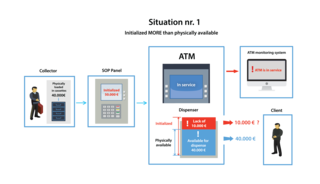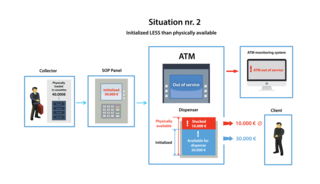The Lithuanian Penkių kontinentų bankinės technologijos company has offered its Cash Management.iQ software solution, which helps to automate cash distribution processes at all deposit / withdrawal points, for several years already.
 The Lithuanian Penkių kontinentų bankinės technologijos company has offered its Cash Management.iQ software solution, which helps to automate cash distribution processes at all deposit / withdrawal points, for several years already.
The Lithuanian Penkių kontinentų bankinės technologijos company has offered its Cash Management.iQ software solution, which helps to automate cash distribution processes at all deposit / withdrawal points, for several years already.
The new Cash Management.iQ version has a function that can be useful to all companies dealing with monitoring and management of replenishments in ATM networks.
Currently, when loading an ATM, apart from manual loading of cassettes, one has to indicate the number of loaded notes for each cassette manually. For safety reasons this process remains under the human (namely, the collector‘s loading the cassettes) control.
Having loaded the cassettes, the collector must enter the number of notes in each cassette on a special ATM operator’s panel and, of course, this does not exclude possible errors.
On the contrary, indicating a larger number of banknotes than that is really loaded will lead to a case when the cassette is empty, the ATM monitoring and control system receive erroneous information on the ATM current balance, and indicate its "in service" status.

If a lesser number of banknotes than that is really loaded into the cassette is entered, the ATM fails to dispense all the bills.
The new Cash Management.iQ functionality offers real-time notice of such data entry errors.
The Cash Management.iQ system monitors the compliance of the cash order data and the data entered through the operator panel on the cash dispenser.
The Cash Management.iQ alert mechanism allows to promptly respond to data mismatches by displaying appropriate signals on the interface, sending e-mails and providing the ability to generate relevant reports.
Besides, Cash Management.iQ allows correcting data within the ATM operating cycle (the replenishment cycle).
Cash Management.iQ fixes errors and performs appropriate real-time data correction for exact ATM cash monitoring and making actual postings to external systems concerning ATM loading, unloading and balancing.
The functionality has successfully passed industrial tests and has practical application already.
More information on Cash Management.iQ